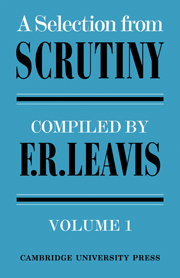7 - JUDGMENT AND ANALYSIS: NOTES IN THE ANALYSIS OF POETRY
Published online by Cambridge University Press: 08 January 2010
Summary
Notes in the Analysis of Poetry (i)
When we look at Heraclitus we see that the directly emotional and personal insistence distinguishing it is associated with an absence of core or substance: the poem seems to be all emotional comment, the alleged justifying situation, the subject of comment, being represented by loosely evocative generalities, about which the poet feels vaguely if ‘intensely’ (the ‘intensity’ of this kind of thing is conditioned by vagueness). Again, the emotion seems to be out there on the page, whereas in reading Proud Maisie we never seem to be offered emotions as such; the emotion develops and defines itself as we grasp the dramatic elements the poem does offer—the data it presents (that is the effect) with emotional ‘disinterestedness’. For ‘disinterestedness’ we can substitute ‘impersonality’, with which term we introduce a critical topic of the first importance.
Someone may comment that, on the one hand, for Scott, whose poetic impulse clearly came not from any inescapable pang experienced in his immediately personal life, but from an interest in ballads and in the ballad-convention, the impersonality of his poem was an easy achievement, while, on the other hand, absence of impersonality in the handling of poignant emotion needn't be accompanied by the selfcherishing emotionality, the wallowing complaisance, of Heraclitus. These matters can be carried further, and the essential distinctions given force, only by close and varied reference to the concrete.
- Type
- Chapter
- Information
- A Selection from Scrutiny , pp. 211 - 257Publisher: Cambridge University PressPrint publication year: 1968
- 6
- Cited by



